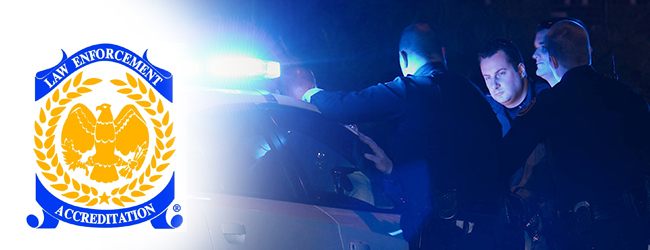ADMINISTRATIVE DIVISION
OTHER DIVISIONS
ACCREDITATION AND RESEARCH
Accreditation recognizes professional excellence in law enforcement services by offering bodies of national standards that law enforcement agencies are required to comply with. Accreditation status for law enforcement agencies are similar to accredited institutions such as hospitals, colleges and universities.
The Memphis Police Department is pursuing accreditation to improve the delivery of law enforcement services to the Citizens of Memphis, city employees and the community as a whole.
What are some of the benefits of achieving Accreditation status?
- Obtaining international excellence in the delivery of police services.
- Controlled liability insurance cost.
- Administrative Improvements.
- Greater Accountability from Supervisors.
- Increased government and community support.
The accreditation process consists of five (5) phases:
1. Application Phase
2. Self-Assessment Phase
3. On-Site Assessment Phase
4. Commission Review Phase
5. Maintaining Compliance and Re-Accreditation Phase.
The Memphis Police Department is currently in the Maintaining Compliance and Re-Accreditation phase of the accreditation process.
Accreditation is a continuous process and is awarded in three year increments. Police agencies are required to maintain accreditation through annual report submissions and compliance.
WHAT IS CALEA?
The process of Accreditation, which takes approximately three (3) years, is voluntary and is non-adversarial.
The Commission on Accreditation for Law Enforcement Agencies (CALEA), was formed in 1979 to establish a body of standards designed to increase law enforcement agencies capabilities and to prevent and control crime.
The Commission consists of twenty-one members and includes major membership associations such as:
IACP – International Association of Chiefs of Police.
NOBLE – National Organization of Black Law Enforcement Executives.
NSA – National Sheriffs’ Association
PERF – Police Executive Research Forum.
STANDARDS OF ACCREDITATION
The standards address six major law enforcement subjects:
- role, responsibilities, and relationships with other agencies;
- organization, management, and administration;
- personnel administration;
- law enforcement operations, operational support, and traffic law enforcement;
- prisoner and court-related services; and
- auxiliary and technical services.
The standards help law enforcement agencies (1) strengthen crime prevention and control capabilities; (2) formalize essential management procedures; (3) establish fair and nondiscriminatory personnel procedures; (4) improve service-delivery; (5) solidify interagency cooperation and coordination; and (6) boost citizen and staff confidence.
Agencies that seek accreditation are required to comply only with those standards that are specifically applicable to them. Applicability is based on two factors: an agency’s size and the functions it performs. Applicable standards are categorized as mandatory or other-than -mandatory. Agencies must comply with all applicable mandatory standards and eighty percent of applicable other-than-mandatory standards. If an agency cannot comply with a standard because of legislation, labor agreements, court orders, or case law, waivers can be sought from the Commission.
Seeking to establish the best professional practices, the standards prescribe “what” agencies should be doing, but not “how” they should be doing it. That decision is left up to the individual agency and its Chief Executive Officer.
Staffs of the Commission’s four law enforcement founders drafted the initial standards. Law enforcement practitioners and researchers reviewed them, and they were subjected to structured field tests in different sized law enforcement agencies before being finally adopted by the Commission in 1983. The Commission’s committees monitor the standards for needed additions, revisions, and interpretations.
For more information about the MPD’s Accreditation Process:
Accreditation & Research Management:
Lt. Frankie Lanton: 901-636-3406
Lt. Kedra Lockhart: 901-636-3268
Mailing Address:
170 North Main Street
11th Floor, Rm. 11-14




